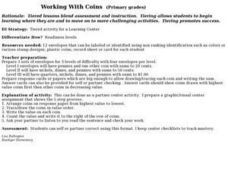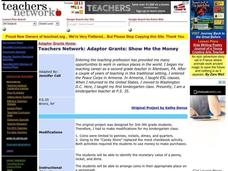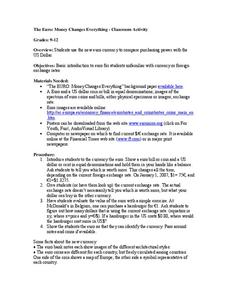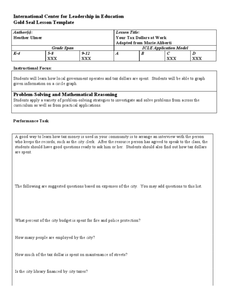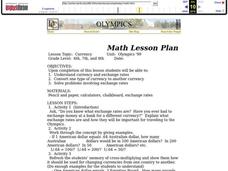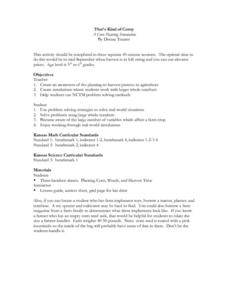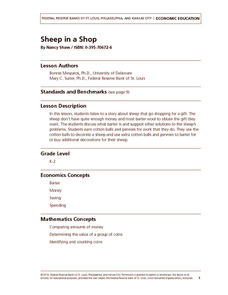Curated OER
Working With Coins
Students arrange coins based on their value. In this coins instructional activity, students trace and record the value of each coin. Students count up to find the total value of all the coins.
Curated OER
Show Me the Money
Young scholars study the monetary value of a penny, nickel, and dime. They simulate a candy store by calculating the proper amount of money needed to purchase candy. After viewing a video, they complete the "Handful of Coins" pictograph .
Curated OER
Piggin' out with Money
Third graders manage money. In this money math lesson plan, 3rd graders read Pigs Will be Pigs. Students then use manipulatives to practice adding monetary amounts and making change. Students also practice working with money on selected...
Curated OER
The Euro: Money Changes Everything
Ninth graders compare the Euro with the purchasing power of the US dollar. In this economic lesson, 9th graders evaluate the value of the Euro through various exercises. Students research the currency exchange rates of the Euro.
Curated OER
Your Tax Dollars at Work
In order to understand how tax dollars are spent, young economists use given data and graph it on a circle graph. Circle graphs are highly visual and can help individuals describe data. A class discussion follows the initial activity.
Practical Money Skills
Saving and Investing
Learn the difference between saving money and investing money, as well as the advantages and disadvantages of each. Kids review banking and personal finance terms before studying the different ways that people can reach their financial...
Kelly's Kindergarten
April Daily Resources
Spring has sprung in your classroom! An entire month of activities relating to spring prompts learners to color, draw, write, and work on phonics.
Curated OER
Currency
Students investigate currency and exchange rates. In the middle school mathematics lesson, students use ratio and proportion to convert from one type of currency to another. Students solve problems involving currency exchange.
Curated OER
Count Coins and Bills
Learners study the names and values of different denominations of paper money, count sets of money that include both coins and bills. They complete a money chart, read and solve word problems.
Curated OER
Spending Money
Students complete activities to study the value of money. For this money study lesson, students read a story about money and discuss how they earn money at home. Students watch a related video clip and create a class book about the ways...
Curated OER
Coins: Names and Value
Learners read the story Benny's Pennies and play a matching game where they match the coin to it's value. In this coins lesson plan, students use the SMART Board to view coins.
Curated OER
Let's Find Out About Money
First graders investigate the uses and development of money as part of the study of finance. They focus upon the recognition of different coins and identify the value of each. Then students solve problems involving money and coins.
Curated OER
ESOL: Time and Money
Students study time and money. They read and practice cardinal numbers using numerals and words. They collaborate in apirs and exchange flashcards identifying cardinal numbers 0-10. They complete an activity sheet and show pictures and...
Curated OER
Gifts from Grandma, Variation 1
Composed of three word problems, this math activity exposes young mathematicians to relationships present in multiplication and division. The first problem is most useful with a tape diagram in which learners are working with equal-sized...
Curated OER
Children's Literature Across the Curriculum Ideas-If You Made A Million
Learners read If You Made A Million by David M. Schwartz. They complete a variety of cross-curricular activities surrounding the study of earning, saving and spending money. Included are reading, art, math, science, writing, social...
Curated OER
Classroom Supplies
Challenge young mathematicians to buy classroom supplies by staying within the means of a $1,000 budget. The mathematical activity provides learners with the opportunity to decide what items from the supply list would benefit a class of...
Curated OER
Scarcity and Choice
After reading the book A Bargain for Frances, young economists discuss how money is exchanged for goods or services. They demonstrate effective financial decision-making by listing ways to save money for a product they would like to buy.
Curated OER
That's Kind of Corny!
Students apply math skills to determining how much corn seed to plant in 100 acres. They compute the amount of weed killer needed and after totaling how many bushels per acre they harvest, they calculate their profits.
Federal Reserve Bank
Sheep in a Shop
What do you think sheep might be able to barter when they don't have quite enough to buy a gift? Your pupils can find out this and much more during this lesson about Sheep in a Shop, spending, saving, and bartering.
Curated OER
Coin Count & Classification
Students make a prediction about how 100 pennies sort by decade or year and then test their predictions. They organize their data using a graph that is imbedded in this lesson.
Curated OER
Making $ents
Second graders complete several activities that give them opportunities to practice and model strategies that help them count money. They read The Penny Pot storybook; they play a trading game with various coins. They participate in a...
Curated OER
Saving Makes Cents
Students identify ways families save money. In this financial lesson, students read the book A Chair for My Mother and discuss ways to save money. Students identify coin values and practice counting money.
Curated OER
Labor, Choice, and Sales Tax
Students consider the idea of earning and spending money. In this money management lesson plan, students discuss the concept of saving and spending money through the reading of a story and by completing several activities that involve...
Curated OER
How do You Stack Up? Revisited
Students estimate the thickness of coins. In this stack up lesson, students stack pennies, nickels, dimes and quarters. They calculate and record the thickness of each coin. Students stack coins and estimate the height of the stack.


